Thomas James Richards, Diaries, Transcript Vol. 2 - Part 16
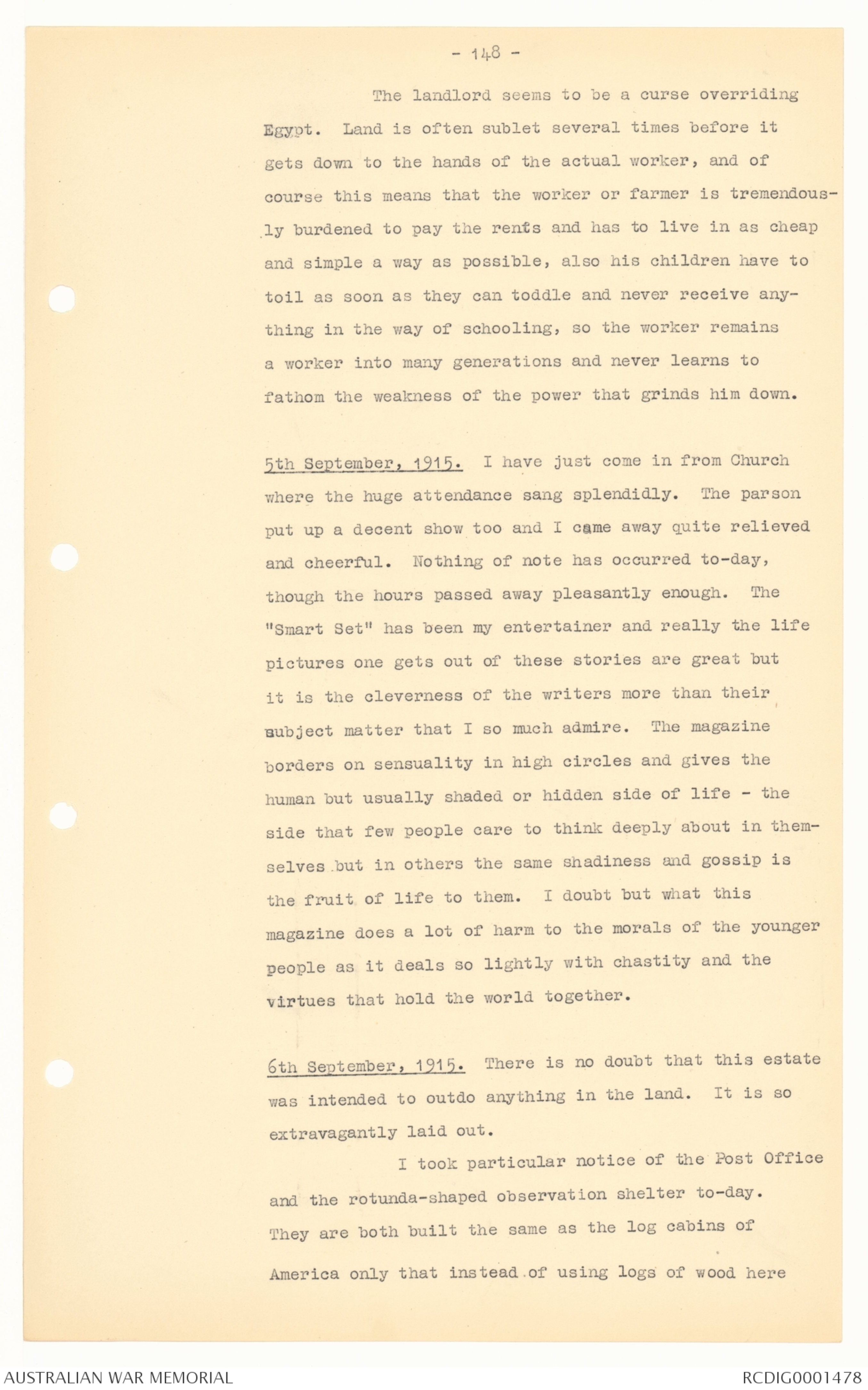
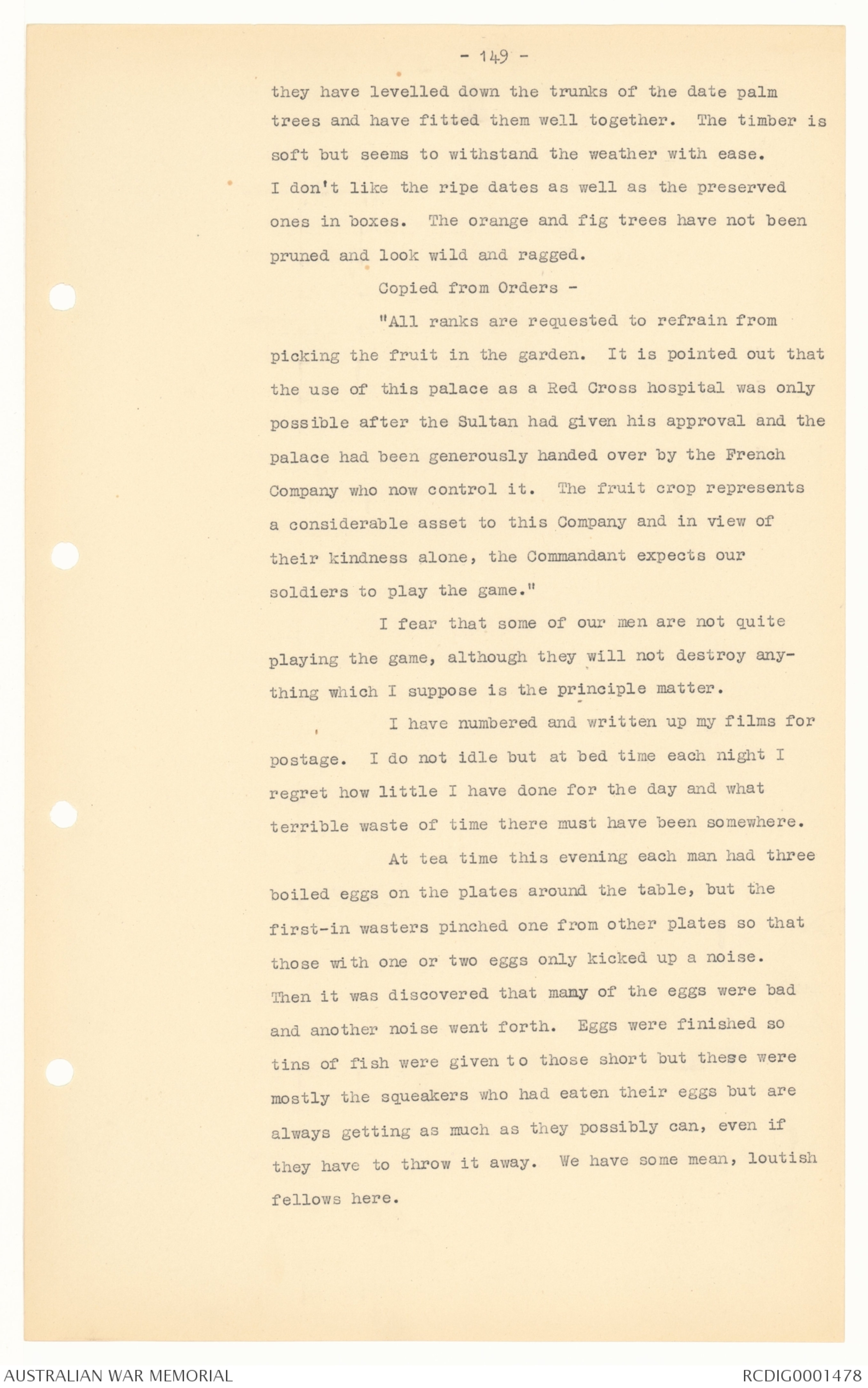
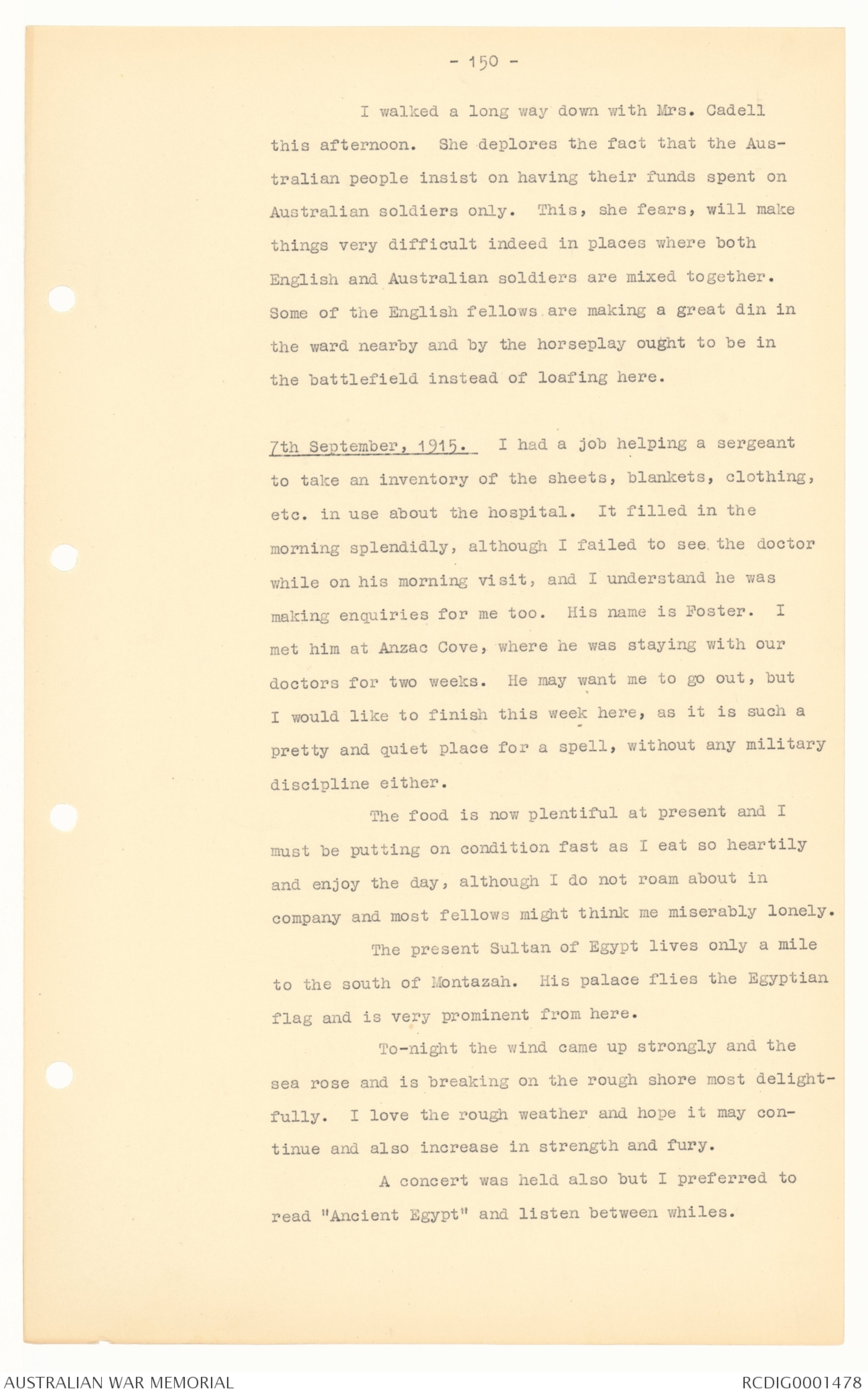
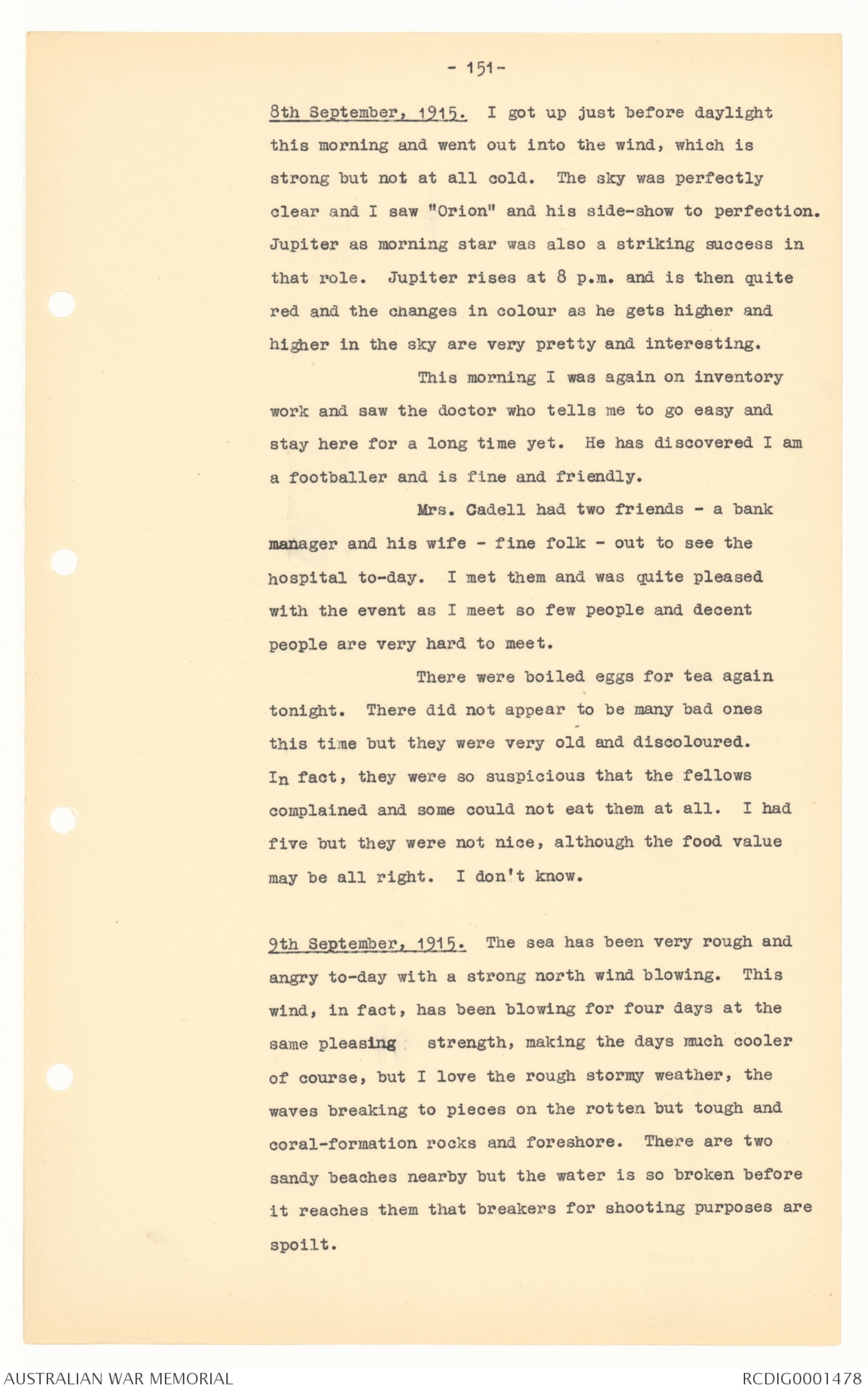
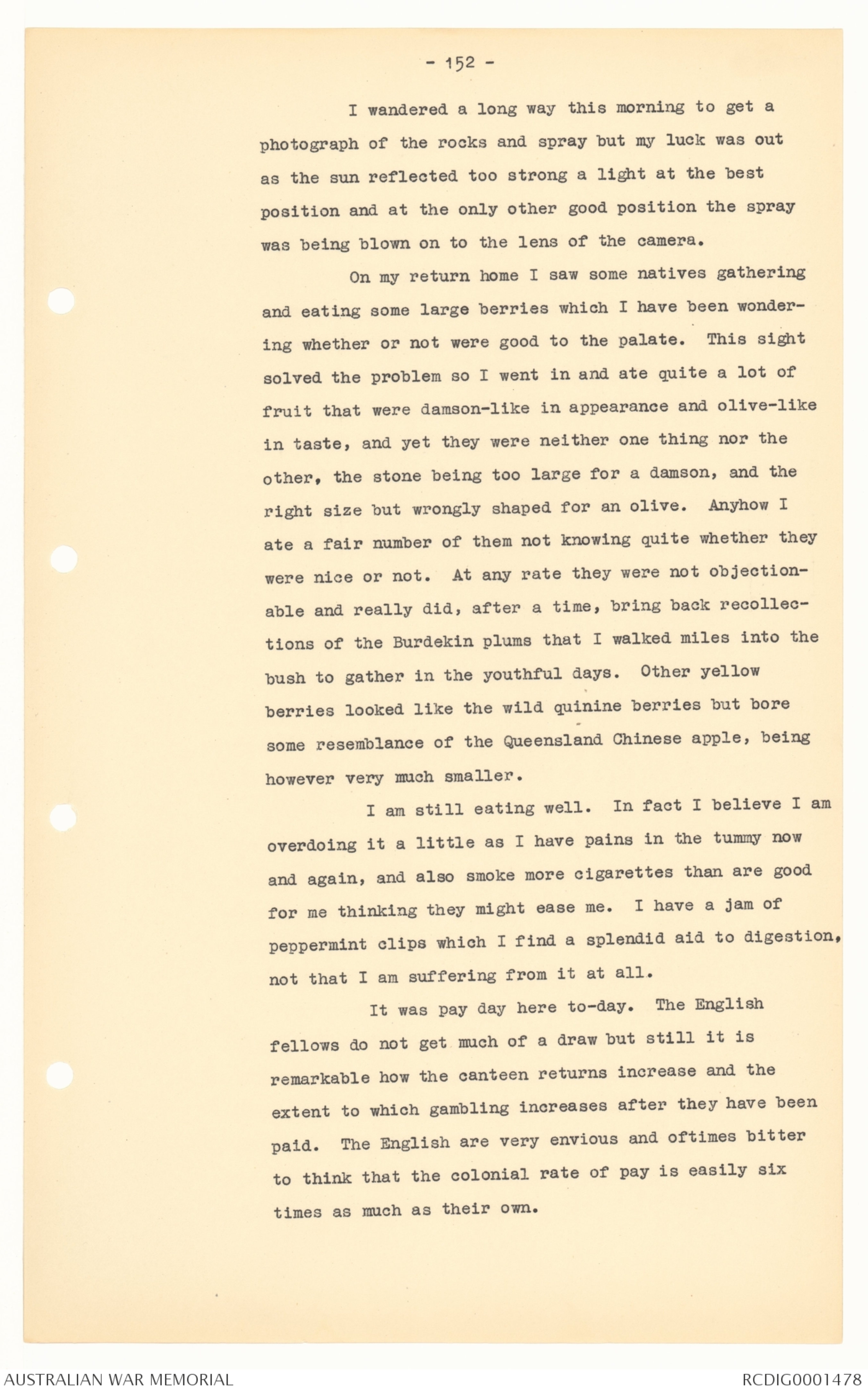
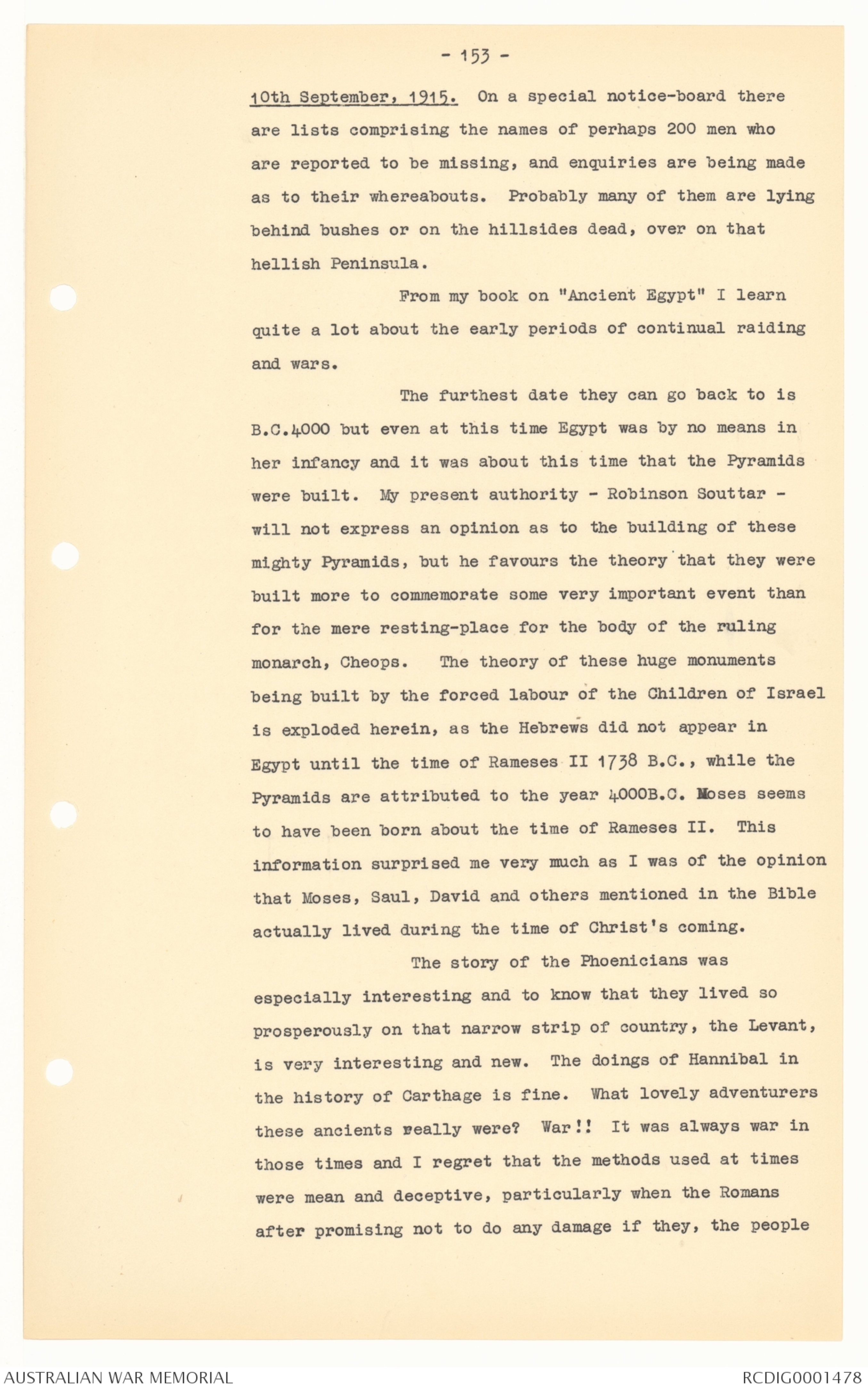
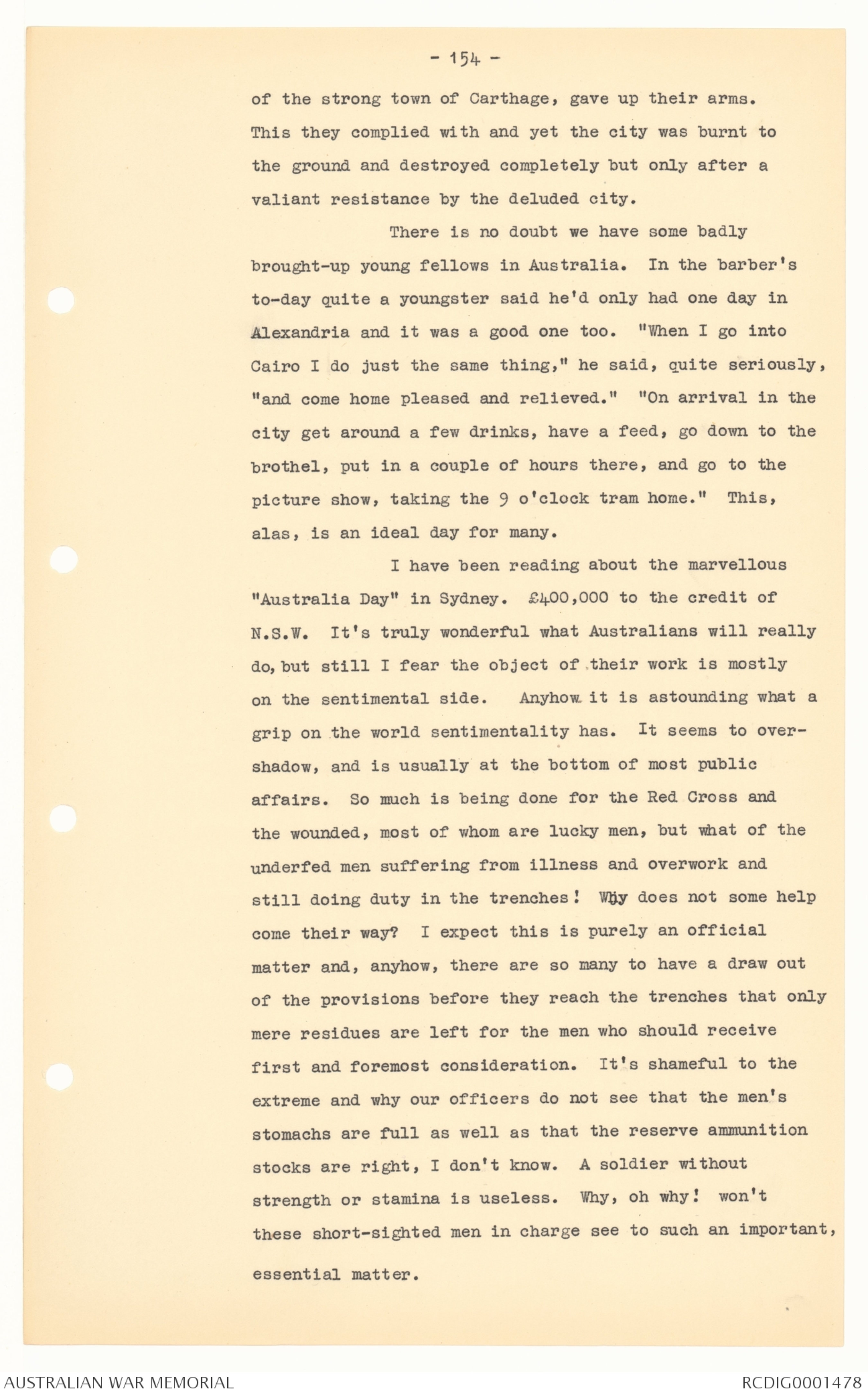
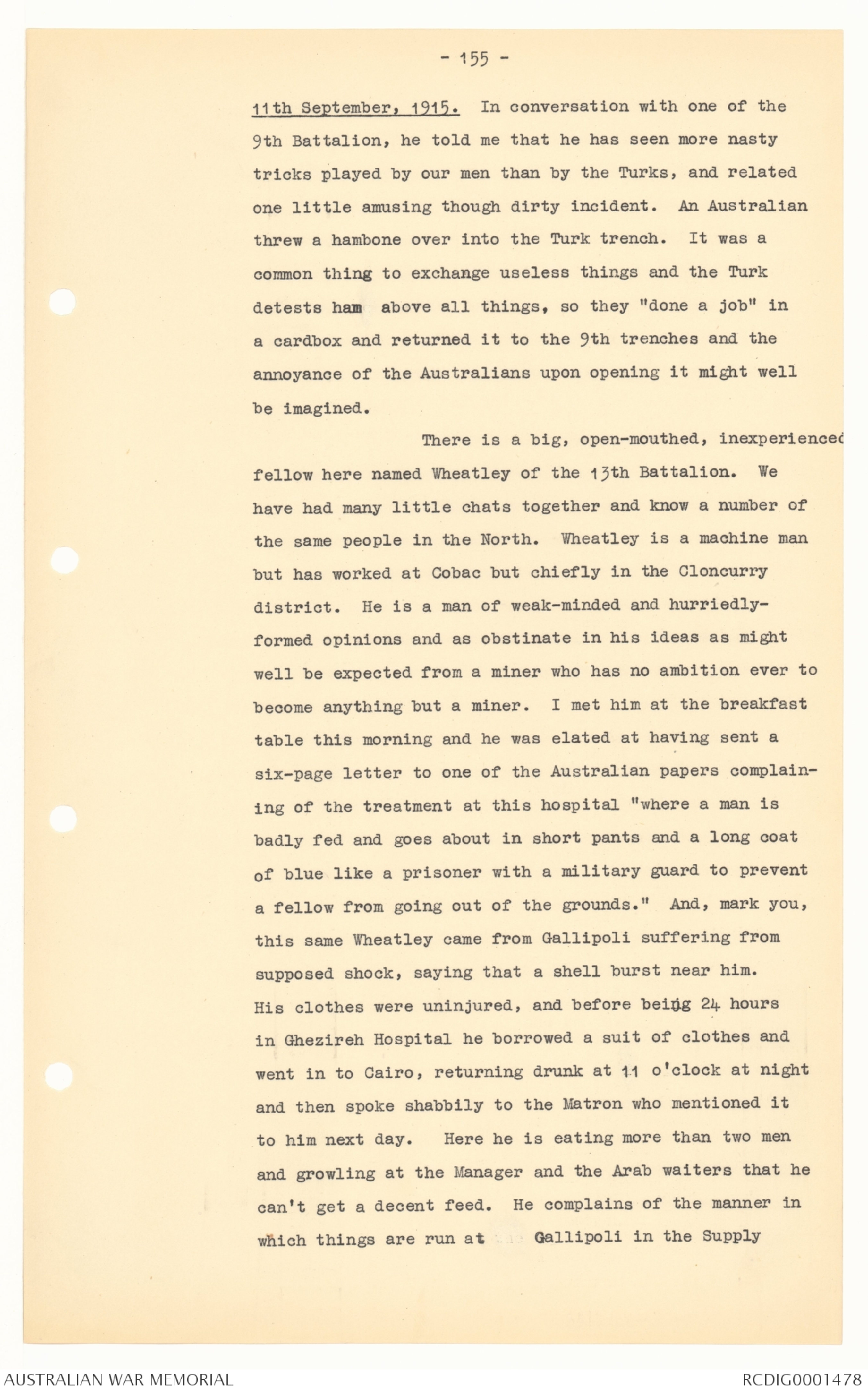
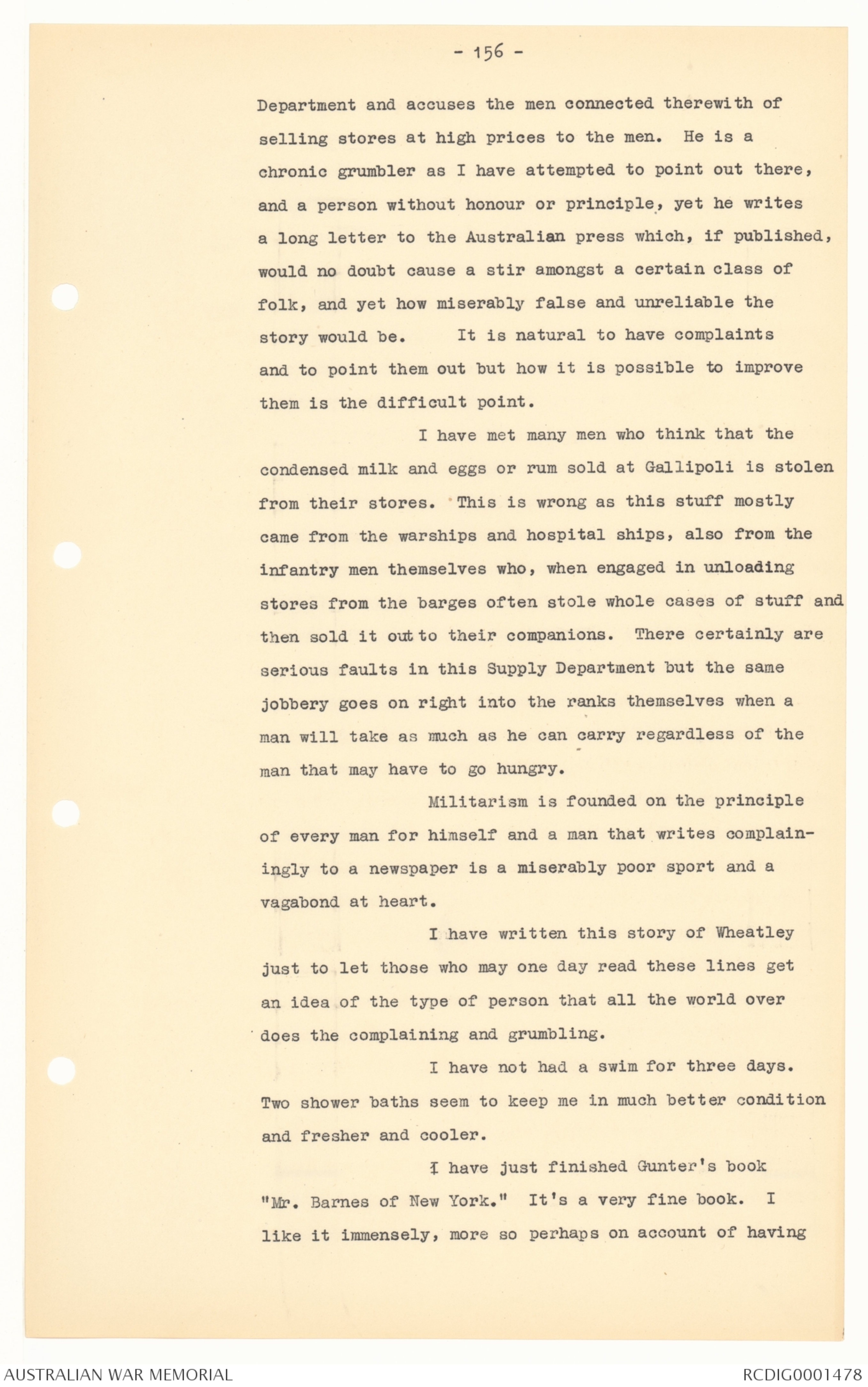
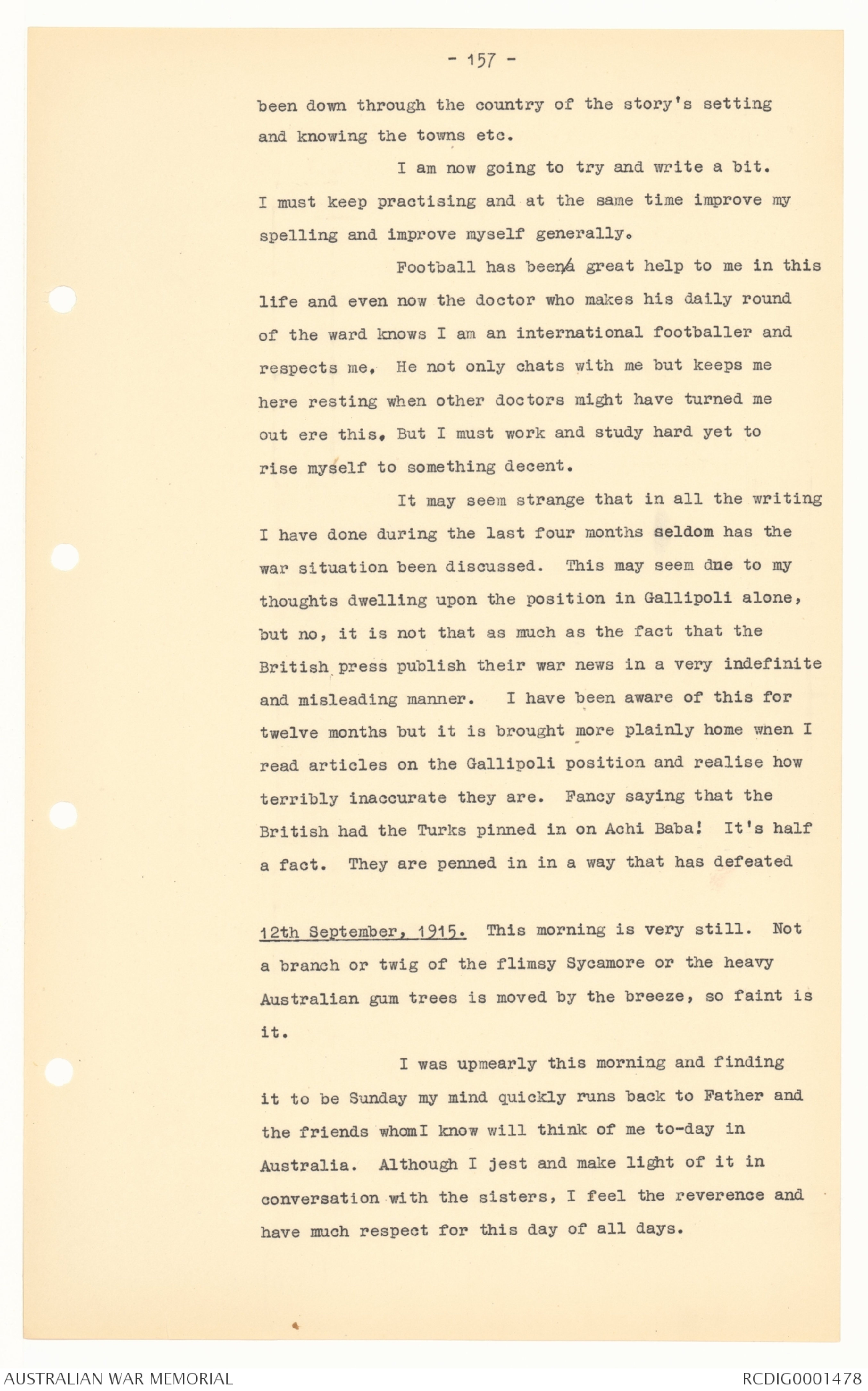
- 148 -
The landlord seems to be a curse overriding
Egypt. Land is often sublet several times before it
gets down to the hands of the actual worker, and of
course this means that the worker or farmer is tremendously
burdened to pay the rents and has to live in as cheap
and simple a way as possible, also his children have to
toil as soon as they can toddle and never receive anything
in the way of schooling, so the worker remains
a worker into many generations and never learns to
fathom the weakness of the power that grinds him down.
5th September, 1915. I have just come in from Church
where the huge attendance sang splendidly. The parson
put up a decent show too and I came away quite relieved
and cheerful. Nothing of note has occurred to-day,
though the hours passed away pleasantly enough. The
"Smart Set" has been my entertainer and really the life
pictures one gets out of these stories are great but
it is the cleverness of the writers more than their
subject matter that I so much admire. The magazine
borders on sensuality in high circles and gives the
human but usually shaded or hidden side of life - the
side that few people care to think deeply about in themselves
but in others the same shadiness and gossip is
the fruit of life to them. I doubt but what this
magazine does a lot of harm to the morals of the younger
people as it deals so lightly with chastity and the
virtues that hold the world together.
6th September, 1915. There is no doubt that this estate
was intended to outdo anything in the land. It is so
extravagantly laid out.
I took particular notice of the Post Office
and the rotunda-shaped observation shelter to-day.
They are both built the same as the log cabins of
America only that instead of using logs of wood here
- 149 -
they have levelled down the trunks of the date palm
trees and have fitted them well together. The timber is
soft but seems to withstand the weather with ease.
I don't like the ripe dates as well as the preserved
ones in boxes. The orange and fig trees have not been
pruned and look wild and ragged.
Copied from Orders -
"All ranks are requested to refrain from
picking the fruit in the garden. It is pointed out that
the use of this palace as a Red Cross hospital was only
possible after the Sultan had given his approval and the
palace had been generously handed over by the French
Company who now control it. The fruit crop represents
a considerable asset to this Company and in view of
their kindness alone, the Commandant expects our
soldiers to play the game."
I fear that some of our men are not quite
playing the game, although they will not destroy anything
which I suppose is the principle matter.
I have numbered and written up my films for
postage. I do not idle but at bed time each night I
regret how little I have done for the day and what
terrible waste of time there must have been somewhere.
At tea time this evening each man had three
boiled eggs on the plates around the table, but the
first-in wasters pinched one from other plates so that
those with one or two eggs only kicked up a noise.
Then it was discovered that many of the eggs were bad
and another noise went forth. Eggs were finished so
tins of fish were given to those short but these were
mostly the squeakers who had eaten their eggs but are
always getting as much as they possibly can, even if
they have to throw it away. We have some mean, loutish
fellows here.
- 150 -
I walked a long way down with Mrs. Cadell
this afternoon. She deplores the fact that the Australian
people insist on having their funds spent on
Australian soldiers only. This, she fears, will make
things very difficult indeed in places where both
English and Australian soldiers are mixed together.
Some of the English fellows are making a great din in
the ward nearby and by the horseplay ought to be in
the battlefield instead of loafing here.
7th September, 1915. I had a job helping a sergeant
to take an inventory of the sheets, blankets, clothing,
etc. in use about the hospital. It filled in the
morning splendidly, although I failed to see the doctor
while on his morning visit, and I understand he was
making enquiries for me too. His name is Foster. I
met him at Anzac Cove, where he was staying with our
doctors for two weeks. He may want me to go out, but
I would like to finish this week here, as it is such a
pretty and quiet place for a spell, without any military
discipline either.
The food is now plentiful at present and I
must be putting on condition fast as I eat so heartily
and enjoy the day, although I do not roam about in
company and most fellows might think me miserably lonely.
The present Sultan of Egypt lives only a mile
to the south of Montazah. His palace flies the Egyptian
flag and is very prominent from here.
To-night the wind came up strongly and the
sea rose and is breaking on the rough shore most delightfully.
I love the rough weather and hope it may continue
and also increase in strength and fury.
A concert was held also but I preferred to
read "Ancient Egypt" and listen between whiles.
- 151 -
8th September, 1915. I got up just before daylight
this morning and went out into the wind, which is
strong but not at all cold. The sky was perfectly
clear and I saw "Orion" and his side-show to perfection.
Jupiter as morning star was also a striking success in
that role. Jupiter rises at 8 p.m. and is then quite
red and the changes in colour as he gets higher and
higher in the sky are very pretty and interesting.
This morning I was again on inventory
work and saw the doctor who tells me to go easy and
stay here for a long time yet. He has discovered I am
a footballer and is fine and friendly.
Mrs. Cadell had two friends - a bank
manager and his wife - fine folk - out to see the
hospital to-day. I met them and was quite pleased
with the event as I meet so few people and decent
people are very hard to meet.
There were boiled eggs for tea again
tonight. There did not appear to be many bad ones
this time but they were very old and discoloured.
In fact, they were so suspicious that the fellows
complained and some could not eat them at all. I had
five but they were not nice, although the food value
may be all right. I don't know.
9th September, 1915. The sea has been very rough and
angry to-day with a strong north wind blowing. This
wind, in fact, has been blowing for four days at the
same pleasing strength, making the days much cooler
of course, but I love the rough stormy weather, the
waves breaking to pieces on the rotten but tough and
coral-formation rocks and foreshore. There are two
sandy beaches nearby but the water is so broken before
it reaches them that breakers for shooting purposes are
spoilt.
- 152 -
I wandered a long way this morning to get a
photograph of the rocks and spray but my luck was out
as the sun reflected too strong a light at the best
position and at the only other good position the spray
was being blown on to the lens of the camera.
On my return home I saw some natives gathering
and eating some large berries which I have been wondering
whether or not were good to the palate. This sight
solved the problem so I went in and ate quite a lot of
fruit that were damson-like in appearance and olive-like
in taste, and yet they were neither one thing nor the
other, the stone being too large for a damson, and the
right size but wrongly shaped for an olive. Anyhow I
ate a fair number of them not knowing quite whether they
were nice or not. At any rate they were not objectionable
and really did, after a time, bring back recollections
of the Burdekin plums that I walked miles into the
bush to gather in the youthful days. Other yellow
berries looked like the wild quinine berries but bore
some resemblance of the Queensland Chinese apple, being
however very much smaller.
I am still eating well. In fact I believe I am
overdoing it a little as I have pains in the tummy now
and again, and also smoke more cigarettes than are good
for me thinking they might ease me. I have a jam of
peppermint clips which I find a splendid aid to digestion,
not that I am suffering from it at all.
It was pay day here to-day. The English
fellows do not get much of a draw but still it is
remarkable how the canteen returns increase and the
extent to which gambling increases after they have been
paid. The English are very envious and oftimes bitter
to think that the colonial rate of pay is easily six
times as much as their own.
- 153 -
10th September, 1915. On a special notice-board there
are lists comprising the names of perhaps 200 men who
are reported to be missing, and enquiries are being made
as to their whereabouts. Probably many of them are lying
behind bushes or on the hillsides dead, over on that
hellish Peninsula.
From my book on "Ancient Egypt" I learn
quite a lot about the early periods of continual raiding
and wars.
The furthest date they can go back to is
B.C.4000 but even at this time Egypt was by no means in
her infancy and it was about this time that the Pyramids
were built. My present authority - Robinson Souttar -
will not express an opinion as to the building of these
mighty Pyramids, but he favours the theory that they were
built more to commemorate some very important event than
for the mere resting-place for the body of the ruling
monarch, Cheops. The theory of these huge monuments
being built by the forced labour of the Children of Israel
is exploded herein, as the Hebrews did not appear in
Egypt until the time of Rameses II 1738 B.C., while the
Pyramids are attributed to the year 4OOOB.C. Moses seems
to have been born about the time of Rameses II. This
information surprised me very much as I was of the opinion
that Moses, Saul, David and others mentioned in the Bible
actually lived during the time of Christ's coming.
The story of the Phoenicians was
especially interesting and to know that they lived so
prosperously on that narrow strip of country, the Levant,
is very interesting and new. The doings of Hannibal in
the history of Carthage is fine. What lovely adventurers
these ancients really were? War!! It was always war in
those times and I regret that the methods used at times
were mean and deceptive, particularly when the Romans
after promising not to do any damage if they, the people
- 154 -
of the strong town of Carthage, gave up their arms.
This they complied with and yet the city was burnt to
the ground and destroyed completely but only after a
valiant resistance by the deluded city.
There is no doubt we have some badly
brought-up young fellows in Australia. In the barber's
to-day quite a youngster said he'd only had one day in
Alexandria and it was a good one too. "When I go into
Cairo I do just the same thing," he said, quite seriously,
"and come home pleased and relieved." "On arrival in the
city get around a few drinks, have a feed, go down to the
brothel, put in a couple of hours there, and go to the
picture show, taking the 9 o'clock tram home." This,
alas, is an ideal day for many.
I have been reading about the marvellous
"Australia Day" in Sydney. £400,000 to the credit of
N.S.W. It's truly wonderful what Australians will really
do, but still I fear the object of their work is mostly
on the sentimental side. Anyhow it is astounding what a
grip on the world sentimentality has. It seems to overshadow,
and is usually at the bottom of most public
affairs. So much is being done for the Red Cross and
the wounded, most of whom are lucky men, but what of the
underfed men suffering from illness and overwork and
still doing duty in the trenches! Why does not some help
come their way? I expect this is purely an official
matter and, anyhow, there are so many to have a draw out
of the provisions before they reach the trenches that only
mere residues are left for the men who should receive
first and foremost consideration. It's shameful to the
extreme and why our officers do not see that the men's
stomachs are full as well as that the reserve ammunition
stocks are right, I don't know. A soldier without
strength or stamina is useless. Why, oh why! won't
these short-sighted men in charge see to such an important,
essential matter.
- 155 -
11th September, 1915. In conversation with one of the
9th Battalion, he told me that he has seen more nasty
tricks played by our men than by the Turks, and related
one little amusing though dirty incident. An Australian
threw a hambone over into the Turk trench. It was a
common thing to exchange useless things and the Turk
detests ham above all things, so they "done a job" in
a cardbox and returned it to the 9th trenches and the
annoyance of the Australians upon opening it might well
be imagined.
There is a big, open-mouthed, inexperienced
fellow here named Wheatley of the 13th Battalion. We
have had many little chats together and know a number of
the same people in the North. Wheatley is a machine man
but has worked at Cobac but chiefly in the Cloncurry
district. He is a man of weak-minded and hurriedly-formed
opinions and as obstinate in his ideas as might
well be expected from a miner who has no ambition ever to
become anything but a miner. I met him at the breakfast
table this morning and he was elated at having sent a
six-page letter to one of the Australian papers complaining
of the treatment at this hospital "where a man is
badly fed and goes about in short pants and a long coat
of blue like a prisoner with a military guard to prevent
a fellow from going out of the grounds." And, mark you,
this same Wheatley came from Gallipoli suffering from
supposed shock, saying that a shell burst near him.
His clothes were uninjured, and before being 24 hours
in Ghezireh Hospital he borrowed a suit of clothes and
went in to Cairo, returning drunk at 11 o'clock at night
and then spoke shabbily to the Matron who mentioned it
to him next day. Here he is eating more than two men
and growling at the Manager and the Arab waiters that he
can't get a decent feed. He complains of the manner in
which things are run at Gallipoli in the Supply
- 156 -
Department and accuses the men connected therewith of
selling stores at high prices to the men. He is a
chronic grumbler as I have attempted to point out there,
and a person without honour or principle, yet he writes
a long letter to the Australian press which, if published,
would no doubt cause a stir amongst a certain class of
folk, and yet how miserably false and unreliable the
story would be. It is natural to have complaints
and to point them out but how it is possible to improve
them is the difficult point.
I have met many men who think that the
condensed milk and eggs or rum sold at Gallipoli is stolen
from their stores. This is wrong as this stuff mostly
came from the warships and hospital ships, also from the
infantry men themselves who, when engaged in unloading
stores from the barges often stole whole cases of stuff and
then sold it out to their companions. There certainly are
serious faults in this Supply Department but the same
jobbery goes on right into the ranks themselves when a
man will take as much as he can carry regardless of the
man that may have to go hungry.
Militarism is founded on the principle
of every man for himself and a man that writes complainingly
to a newspaper is a miserably poor sport and a
vagabond at heart.
I have written this story of Wheatley
just to let those who may one day read these lines get
an idea of the type of person that all the world over
does the complaining and grumbling.
I have not had a swim for three days.
Two shower baths seem to keep me in much better condition
and fresher and cooler.
I have just finished Gunter's book
"Mr. Barnes of New York." It's a very fine book. I
like it immensely, more so perhaps on account of having
- 157 -
been down through the country of the story's setting
and knowing the towns etc.
I am now going to try and write a bit.
I must keep practising and at the same time improve my
spelling and improve myself generally.
Football has been a great help to me in this
life and even now the doctor who makes his daily round
of the ward knows I am an international footballer and
respects me. He not only chats with me but keeps me
here resting when other doctors might have turned me
out ere this. But I must work and study hard yet to
rise myself to something decent.
It may seem strange that in all the writing
I have done during the last four months seldom has the
war situation been discussed. This may seem due to my
thoughts dwelling upon the position in Gallipoli alone,
but no, it is not that as much as the fact that the
British press publish their war news in a very indefinite
and misleading manner. I have been aware of this for
twelve months but it is brought more plainly home when I
read articles on the Gallipoli position and realise how
terribly inaccurate they are. Fancy saying that the
British had the Turks pinned in on Achi Baba! It's half
a fact. They are penned in in a way that has defeated
12th September, 1915. This morning is very still. Not
a branch or twig of the flimsy Sycamore or the heavy
Australian gum trees is moved by the breeze, so faint is
it.
I was up early this morning and finding
it to be Sunday my mind quickly runs back to Father and
the friends whom I know will think of me to-day in
Australia. Although I jest and make light of it in
conversation with the sisters, I feel the reverence and
have much respect for this day of all days.
 Marisa Bortolotto
Marisa BortolottoThis transcription item is now locked to you for editing. To release the lock either Save your changes or Cancel.
This lock will be automatically released after 60 minutes of inactivity.